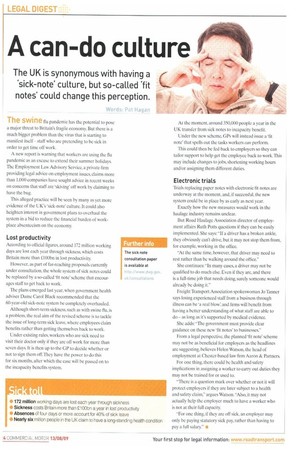A can-do culture
Page 24

If you've noticed an error in this article please click here to report it so we can fix it.
The UK is synonymous with having a 'sick-note' culture, but so-called 'fit notes could change this perception.
Words: Pat Hagan The swine flu pandemic has the potential to pose a major threat to Britain's fragile economy. But there is a much bigger problem than the virus that is starting to manifest itself— staff who are pretending to be sick in order to get time off work.
A new report is warning that workers are using the flu pandemic as an excuse to extend their summer holidays. The Employment Law Advisory Service, a private firm providing legal advice on employment issues, claims more than 1,000 companies have sought advice in recent weeks on concerns that staff are 'skiving' off work by claiming to have the bug.
This alleged practice will be seen by many as yet more evidence of the UK's 'sick-note' culture, It could also heighten interest in government plans to overhaul the system in a bid to reduce the financial burden of workplace absenteeism on the economy.
Lost productivity
According to official figures, around 172 million working days are lost each year through sickness, which costs Britain more than £100bn in lost productivity.
However, as part of far-reaching proposals currently under consultation, the whole system of sick notes could be replaced by a so-called 'fit note' scheme that encourages staff to get back to work.
The plans emerged last year, when government health adviser Dame Carol Black recommended that the 60-year-old sick-note system be completely overhauled.
Although short-term sickness, such as with swine flu, is a problem, the real aim of the revised scheme is to tackle the issue of long-term sick leave, where employees claim benefits rather than getting themselves back to work.
Under existing rules, workers who are sick need to visit their doctor only if they are off work for more than seven days. It is then up to the GP to decide whether or not to sign them off. They have the power to do this for six months, after which the case will be passed on to the incapacity benefits system. At the moment, around 350.000 people a year in the UK transfer from sick notes to incapacity benefit.
Under the new scheme, GPs will instead issue a 'fit note' that spells out the tasks workers can perform.
This could then be fed back to employers so they can tailor support to help get the employee back to work. This may include changes to jobs, shortening working hours and/or assigning them different duties.
Electronic trials
Trials replacing paper notes with electronic fit notes are underway at the moment, and, if successful, the new system could be in place by as early as next year.
Exactly how the new measures would work in the haulage industry remains unclear.
But Road Haulage Association director of employment affairs Ruth Potts questions if they can be easily implemented. She says: "If a driver has a broken ankle, they obviously can't drive, but it may not stop them from, for example, working in the office.
"At the same time, however, that driver may need to rest rather than be walking around the office."
She continues: "in many cases, a driver may not be qualified to do much else. Even if they are, and there is a full-time job that needs doing, surely someone would already be doing it."
Freight Transport Association spokeswoman Jo Tanner says losing experienced staff from a business through illness can be 'a real blow', and firms will benefit from having a better understanding of what staff are able to do — as long as it's supported by medical evidence.
She adds: "The government must provide clear guidance on these new 'fit notes' to businesses."
From a legal perspective, the planned 'fit note' scheme may not be as beneficial for employers as the headlines are suggesting, believes Helen Watson. the head of employment at Chester-based law firm Aaron & Partners.
For one thing, there could be health and safety implications in assigning a worker to carry out duties they may not he trained for or used to.
"There is a question mark over whether or not it will protect employers if they are later subject to a health and safety claim," argues Watson. "Also, it may not actually help the employer much to have a worker who is not at their full capacity.
-For one thing, if they are off sick, an employer may only be paying statutory sick pay, rather than having to pay a full salary." •












































































































































